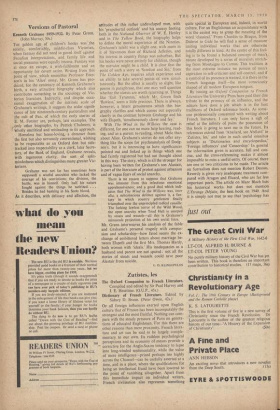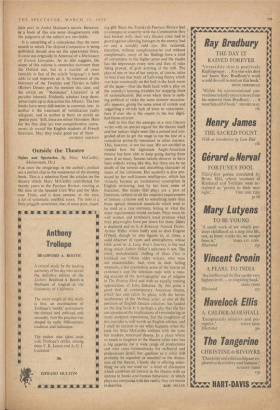Zutistes, les
The Oxford Companion to French Literature. Compiled and edited by Sir Paul Harvey and • J. E. Heseltine. (0.U.P., 45s.) Dictionary of French Literature. Edited by Sidney D. Braun. (Peter Owen, 42s.) OF all foreign influences exerted upon English culture that of France has been incomparably the strongest and the most fruitful. Nothing can com- pare with the steady pressure of Paris on genera- tions of educated Englishmen. For this there are other reasons than mere proximity. French litera- ture and art can be said to be largely comple- mentary to our own. Its ruthless psychological perceptions and its economy of means provide a corrective for the Anglo-Saxon tendency to lapse into long-winded sentimentality, while the value of mere intelligence—prized perhaps too highly across the Channel—can be usefully asserted at a time, and in a place, where the qualifications for being an intellectual fraud have been lowered to the point of vanishing altogether. Apart from this immediate impact on individual writers, French civilisation also represents something
quite special in European and, indeed, in world culture. For an Englishman an acquaintance with it is the easiest way to grasp the meaning of the word 'classical.' From Chardin to Braque, from Diderot to Gide he will find a sense of measure uniting individual works that are otherwise totally different in kind. At the centre of this feel- ing is to be found a balanced concept of man's nature developed by a series of moralists stretch- ing from Montaigne to Camus. This tradition is the most extreme instance we possess of man's aspiration to self-criticism and self-control; and if a symbol of its presence is wanted, it is there in the French language itself—the most consciously shaped of all modern European tongues.
By issuing an Oxford Companion to French Literature the University Press have paid their due tribute to the primacy of its influence, and the editors have done a job which is in the best traditions of Oxford reference books. As some- one professionally concerned with writing about French literature, I can only heave a sigh of relief at the infinity of pains the possession of this book is going to save me in the future. Its references extend from 'Abailard, see Abelard' to `Zutistes, les,' and take in such useful omnibus subjects as 'Dictionaries and encycloptedias,' 'Foreign influences' and 'Censorship.' In general the information given is accurate, full and con- cise, and the cross-referencing makes it almost impossible to miss a useful entry. Of course, there are one or two criticisms to be made. The article on Surrealism does not mention Robert Desnos. Reverdy is given very inadequate treatment com- pared with Aragon and Eluard, who are far less important poets. The article on Marc Bloch lists his historical works but does not mention L'Etrange Defaite, the best book on 1940. And it is simply not true to say that 'psychology has
little part' in Andre Malraux's novels. However, in a book of this size some disagreements with the judgment of the editors are inevitable.
It is something of a coincidence that the same month in which The Oxford Companion is being published should also see the appearance (here, it came out originally in America) of a Dictionary of French Literature. As its title suggests, the scope of this volume is somewhat narrower than the Oxford one, but in a number of cases (notably in that of the article 'language') it both adds to and improves on it. Its treatment of the literature of the Twenties and Thirties is fuller (Robert Desnos gets his mention this time, and the article on "Resistance" Literature' is of peculiar interest). Evidently scholars keep them- selves more up to date across the Atlantic. The two books have some deficiencies in common, too: in neither is the treatment of versification really adequate, and in neither is there an article on 'poesie pure.' Still, these are minor blemishes. Here for the first time are two comprehensive instru- ments de travail for English students of French literature. May they make good use of them.
ANTHONY HARTLEY



















































 Previous page
Previous page